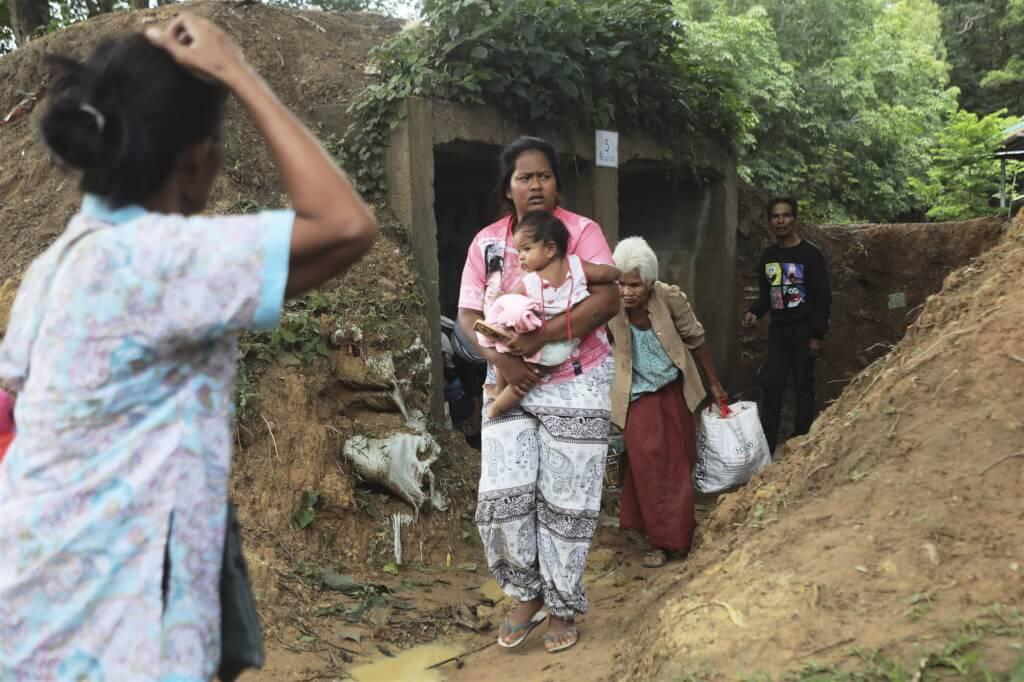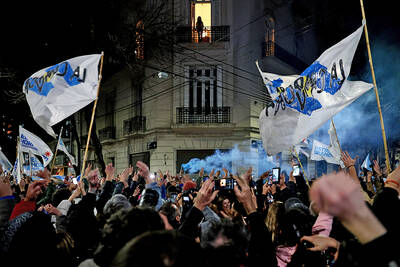Thailand and Cambodia today exchanged fire on their border in a sharp escalation of their conflict that left at least nine civilians dead.
Both nations accused each other of starting the military clashes and downgraded their diplomatic relations yesterday. Thailand also sealed all land border crossings with Cambodia.
Relations between the Southeast Asian neighbors have deteriorated sharply since an armed confrontation in May in which a Cambodian soldier died. Nationalist passions on both sides have further inflamed the situation.

Photo: AP
The Thai army said the most casualties occurred in Si Sa Ket province, where six people were killed after shots were fired at a gas station. At least 14 people were injured in three border provinces.
The Thai army said that today it launched airstrikes on ground military targets in Cambodia, while the Cambodian Ministry of National Defense said that the Thai jets dropped bombs on a road near the ancient Preah Vihear temple.
Clashes are ongoing in at least six areas along the border, Thai Ministry of Defense spokesperson Surasant Kongsiri said.
The first clash this morning happened in an area near the ancient Ta Muen Thom temple along the border of Thailand’s Surin province and Cambodia’s Oddar Meanchey province.
Livestreamed footage from Thailand’s side showed people running from their homes and hiding in a concrete bunker as explosions sounded.
Cambodia has attacked both military and non-military sites in Thailand, including a hospital, the Thai Ministry of Foreign Affairs said.
“The Royal Thai Government calls upon Cambodia to take responsibility for the incidents that have occurred, cease attacks against civilian and military targets, and stop all actions that violate Thailand’s sovereignty. The Royal Thai Government is prepared to intensify our self-defense measures if Cambodia persists in its armed attack and violations upon Thailand’s sovereignty in accordance with international law and principles,” Ministry of Foreign Affairs spokesperson Nikorndej Balankura said.
Cambodian Prime Minister Hun Manet said that his country has always maintained a position of peaceful resolution, but “we have no choice but to respond with armed force against armed aggression.”
Earlier today, Cambodia said it was downgrading diplomatic relations with Thailand to their lowest level, expelling the Thai ambassador and recalling all Cambodian staff from its embassy in Bangkok.
That was in response to Thailand withdrawing its ambassador and yesterday expelling the Cambodian ambassador to protest a land mine blast that wounded five Thai soldiers.
The Thai army said of today's initial clash that its forces heard an uncrewed aerial vehicle before seeing six armed Cambodian soldiers moving closer to Thailand’s station.
Thai soldiers tried to shout at them to defuse the situation, but the Cambodian side started to open fire, it said.
Thailand employed a drone first before opening fire, and Cambodia “acted strictly within the bounds of self-defense, responding to an unprovoked incursion by Thai troops that violated our territorial integrity,” the Cambodian Ministry of National Defense said.
The Thai embassy in Phnom Penh wrote on Facebook that there were clashes at several border areas that could continue to escalate.
Thai nationals in Cambodia should leave the country if they could, while others should not travel to Cambodia unless absolutely necessary, it said.
Yesterday, land mine blast near the border wounded five Thai soldiers, one of whom lost a leg. A week earlier, a land mine in a different contested area exploded and wounded three Thai soldiers when one of them stepped on it and lost a foot.
Thai authorities have alleged the mines were newly laid along paths that by mutual agreement were supposed to be safe.
The mines were Russian-made and not of a type employed by Thailand’s military, they said.
Cambodia rejected Thailand’s account as “baseless accusations,” pointing out that many unexploded mines and other ordnance are a legacy of 20th century wars and unrest.

LANDMARK CASE: ‘Every night we were dragged to US soldiers and sexually abused. Every week we were forced to undergo venereal disease tests,’ a victim said More than 100 South Korean women who were forced to work as prostitutes for US soldiers stationed in the country have filed a landmark lawsuit accusing Washington of abuse, their lawyers said yesterday. Historians and activists say tens of thousands of South Korean women worked for state-sanctioned brothels from the 1950s to 1980s, serving US troops stationed in country to protect the South from North Korea. In 2022, South Korea’s top court ruled that the government had illegally “established, managed and operated” such brothels for the US military, ordering it to pay about 120 plaintiffs compensation. Last week, 117 victims

China on Monday announced its first ever sanctions against an individual Japanese lawmaker, targeting China-born Hei Seki for “spreading fallacies” on issues such as Taiwan, Hong Kong and disputed islands, prompting a protest from Tokyo. Beijing has an ongoing spat with Tokyo over islands in the East China Sea claimed by both countries, and considers foreign criticism on sensitive political topics to be acts of interference. Seki, a naturalised Japanese citizen, “spread false information, colluded with Japanese anti-China forces, and wantonly attacked and smeared China”, foreign ministry spokesman Lin Jian told reporters on Monday. “For his own selfish interests, (Seki)

Argentine President Javier Milei on Sunday vowed to “accelerate” his libertarian reforms after a crushing defeat in Buenos Aires provincial elections. The 54-year-old economist has slashed public spending, dismissed tens of thousands of public employees and led a major deregulation drive since taking office in December 2023. He acknowledged his party’s “clear defeat” by the center-left Peronist movement in the elections to the legislature of Buenos Aires province, the country’s economic powerhouse. A deflated-sounding Milei admitted to unspecified “mistakes” which he vowed to “correct,” but said he would not be swayed “one millimeter” from his reform agenda. “We will deepen and accelerate it,” he

Japan yesterday heralded the coming-of-age of Japanese Prince Hisahito with an elaborate ceremony at the Imperial Palace, where a succession crisis is brewing. The nephew of Japanese Emperor Naruhito, Hisahito received a black silk-and-lacquer crown at the ceremony, which marks the beginning of his royal adult life. “Thank you very much for bestowing the crown today at the coming-of-age ceremony,” Hisahito said. “I will fulfill my duties, being aware of my responsibilities as an adult member of the imperial family.” Although the emperor has a daughter — Princess Aiko — the 23-year-old has been sidelined by the royal family’s male-only